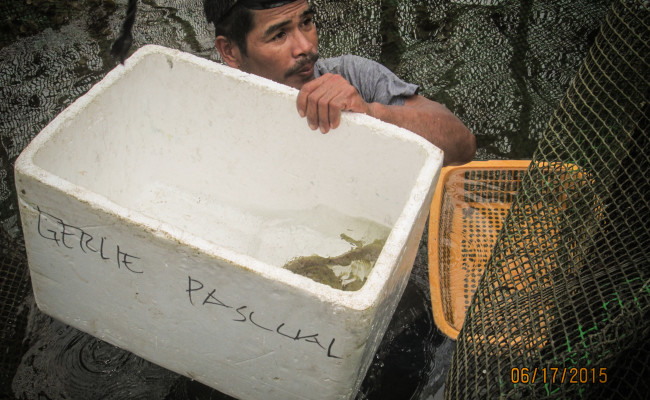Forty-year old Franco Pascual of Barangay Caringo, Mercedes, Camarines Norte leads the association of fish farmers in their community.
He is also one of the many fishermen that ADRA Philippines currently work with for the SARAM (Sustainable and Resilient Agribusiness Development in Mercedes) Project, which is funded by the New Zealand Ministry of Foreign Affairs and Trade in coordination with ADRA New Zealand.
He used to be involved in dynamite fishing, just like the many fishermen in their locality who thought it was the best way to sustain their livelihood. Now, Franco is appreciative of the experiences he gained through the project. He shares why.

How old were you when you started fishing? What fishing techniques did you use before?
I started to fish as a means of income when I was 15 years old. It was my way of helping my parents. I used to fish at San Miguel Bay using illegal techniques (dynamite fishing and compressor fishing). But I also used traditional and acceptable methods like hook and line, and nets.
When did you stop doing illegal fishing, and what was the reason why you stopped?
I stopped fishing illegally when I realized that the fish catch in the wild was declining and being quickly depleted because of these hazardous methods. When I was elected as a “BANTAY DAGAT” last 2012, I knew I had to set the best example. For almost 4 years now, I have been advocating against illegal fishing.
What was your reason why you participated in the ADRA-SARAM Project?
I strongly believed in the objectives of the ADRA-SARAM Project, and I have high hopes that our livelihood and economic problems will be lessened through this project. Another reason why I joined is because I wanted to gain better insights about proper fish farming management through the seminars and trainings.
What is the biggest challenge while being part of the fish farming program? How did you overcome it?
When Typhoon Glenda hit our community last July 15, 2014, it brought damage to our fish cages where we used to grow cultured rabbit fishes, locally called Samaral. The typhoon destroyed and swept away the cages. We were hopeless then. We thought we would not have any fingerlings that could be cultured again.
Despite what we had experienced, we still encouraged each other to move forward and to think positive. We were very happy to find out that ADRA Philippines was still willing to help us through the project. By December 2014, we were given a second batch of high value species of Grouper fish or “Lapu-lapu.” We were also introduced to Seaweeds Farming, which is an alternative source of livelihood for us!
What is the current status of your cultured Grouper or” Lapu-lapu” and Seaweeds Farming?
By the Grace of God, this coming September 04, 2015 we will be having a first harvest of Grouper “lapu-lapu”. Meanwhile, our seaweeds nursery is intact and being prepared for the reproduction of seaweeds seedlings.
As a group leader and the association president, what are your plans after the harvest? How do you intend to sustain these undertakings once the has project ended?
We are already in the planning stage because we want to continue grouper farming and seaweeds farming through the Association. After the harvest of grouper, we will set aside the budget for the next cropping in order to have a sustainable livelihood. The Association will take charge for the management of our fish farming livelihood. Indeed, we are very grateful to this project, particularly to the hard work that ADRA Philippines has done here in Mercedes, and to the New Zealand Government as our donor. We’re so blessed for all that you have done!

